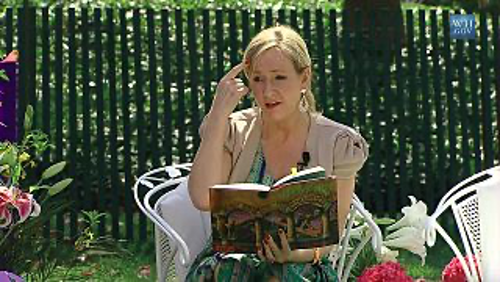
Lumos! Who would have thought that during a delayed train journey in 1990, the Harry Potter world would see the light of day?
The British author, born on July 31, 1965, in Yate, England, grew up with a passion for writing and regularly indulged in creating stories and characters.
In her early adulthood, Rowling faced numerous challenges, including her mother’s death and struggling as a single mother herself. However, she persevered and continued honing her craft.
In 1997, Rowling finally achieved tremendous success with the release of her first novel, “Harry Potter and the Philosopher’s Stone”1. The book, centered around the adventures of a young wizard named Harry Potter, became an instant phenomenon worldwide. It was followed by six more novels in the series, along with complementary books, movies, and merchandise.
Rowling’s extraordinary storytelling ability, combined with her intricate plotlines and well-developed characters, captivated readers of all ages. The success of the Harry Potter series has made Rowling one of the richest and most influential individuals in the world. Beyond her literary accomplishments, she is known for her philanthropy and advocacy for various causes, including improving children’s literacy.
Therefore, her impact on the literary and entertainment industries has been significant and enduring, making her one of the most celebrated authors of her generation.
When philanthropy meets controversy
Yet, despite her high status of philanthropist, in recent years J.K. Rowling has faced criticism and accusations of transphobia due to statements she has made on social media. But what does transphobia mean? Generally, it is categorised as an irrational fear of, aversion to, or discrimination against transgender people.
Rowling expressed concerns about potential conflicts between transgender rights and the rights of cisgender women. Her views on gender identity have been seen by some as exclusionary or insensitive towards transgender individuals.
“‘People who menstruate.’ I’m sure there used to be a word for those people. Someone help me out. Wumben? Wimpund? Woomud?” Rowling tweeted in 2020.
These comments sparked a significant backlash, with LGBTQ+ activists and her own fans expressing disappointment and voicing their disagreement with Rowling’s views. They argued that her statements perpetuated harmful stereotypes and overlooked the struggles and discrimination faced by transgender people. The controversy led to widespread discussions and debates about transgender rights and the responsibilities of influential figures in public discourse.
In terms of response to this criticism, Rowling defended her perspective and stated that she is not transphobic and supports the rights of transgender individuals. She has acknowledged the challenges faced by transgender people but maintains her concerns regarding the rights and safety of cisgender women in certain spaces.
Moreover, the 58-year-old woman found herself at the centre of more controversy, making the headlines again. She revealed in a recent tweet on X that she will be “ready to go to jail” for her opinions on transgender women.
That magic is wrong
Indeed, the Harry Potter books have occasionally faced challenges and requests for removal from certain schools or libraries due to concerns about their content. Some individuals have raised objections to elements of magical or fantastical themes, references to witchcraft and wizardry, or even satanism and the perceived promotion of occult practices. While some critics denounce a distortion of their faith, supporters see it as a true recognition of Christian ideals, particularly with Harry’s resurrection after his sacrifice to defeat Voldemort in the last movie.
So, even if Rowling’s fate is still uncertain, censorship concerning her book series has only been limited to a few places, with no nationwide ban on the horizon. Fans can be reassured. With Christmas coming, make sure not to miss the Hogwarts Express on Platform 93/4 and binge-watch the whole saga, whether you have already done so or not.
Léa Dutrouilh
Renamed “Harry Potter and the Sorcerer’s Stone” in the United States ↩︎


